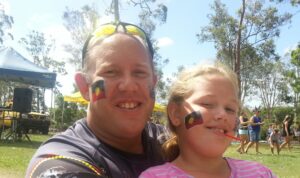This year has hosted perhaps one of the most unusual NAIDOC Weeks, given the restrictions imposed on all of us by the pandemic, yet even worldwide disease and social isolation could not stop the celebrations. This year’s theme, Always Was, Always Will Be, is a familiar catch cry to Aboriginal and Torres Strait Islander peoples, recognising the continuous occupation and connection these peoples have maintained to the land known as Australia for over 65,000 years.Yet in my own reflection of what this phrase means to me, I’ve realised that it’s more than just my connection to a culture and a people. It’s about my own identity as an Aboriginal man in this contemporary world.
Like many Aboriginal peoples born of mixed descent, a history of secrecy and suppression prohibited me from learning of my Aboriginality until I was older, in my case a teenager. This discovery wasn’t so much a surprise as a revelation; like finding something you didn’t even realise you’d lost, yet once you found it you realised it had been missing all along. It was a truth that til then had evaded me. It was something I embraced and was proud of, yet I had no idea how to identify as Aboriginal. Even with next to know knowledge about what it was to ‘be’ Aboriginal, I knew (or at least suspected) that many of my family and friends wouldn’t accept my identity. Even though one of my best friends at school was Aboriginal I couldn’t even tell her, maybe especially not her. I was worried she of all people would accuse me of lying; compared to her and her family, what right did I have to try and compare myself to them? So for many years I kept it to myself and maintained the secrecy that had kept it from me.
It wasn’t until years later that I found the courage to publicly identify as Aboriginal. As fate would have it I decided to attend a cross cultural awareness training course in my workplace. While the course itself was very eye opening and informative, it was the people I met there that brought me out of my shell. As I listened to their stories and experiences, I realised that my own was not much different to theirs. That, coupled with their own diversity – from skin tone to birthplace to upbringing – and openness had me staying back after everyone had left and telling them my own story, or what little of it I knew. To my surprise they were immediately accepting of me and wanting to help set me on my path to discovering and embracing my identity as an Aboriginal person.
Since that time I’ve learned a lot about my identity, my family, and my peoples. I’ve engaged in my community and the broader national and international Indigenous arena. I’ve experienced both acceptance and ridicule, and sometime both, from complete strangers to those I’m closest with. I’ve learned to live in two worlds, making a conscious effort to maintain a connection to my Aboriginality even though, now living half a world away, I’ve been both figuratively and literally distanced from it. I’ve grown both stronger and comfortable in my identity as an Aboriginal – a Bundjalung – man, and realised that whether I knew it or not, I always was and always will be that man. Whether people accept it or not is irrelevant. It’s neither something that can be taken away from me, nor something I could ignore: it’s as much a part of who I am as anything that makes me, me.
I always was, and always will be, proud to be Aboriginal.


